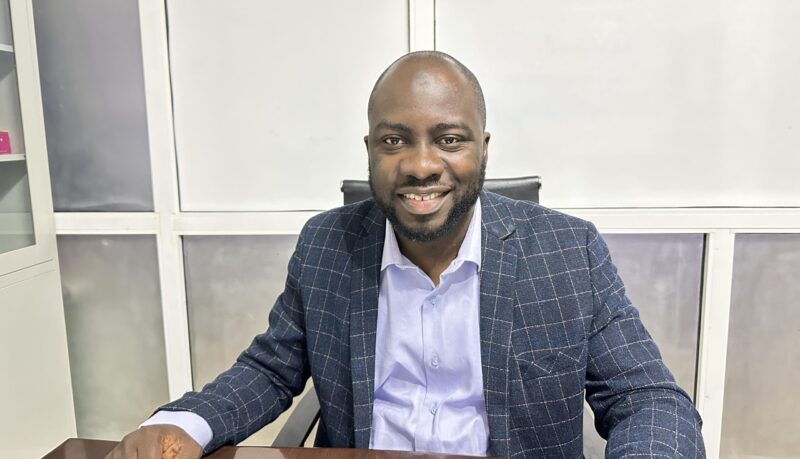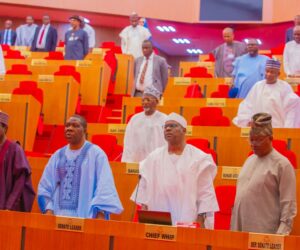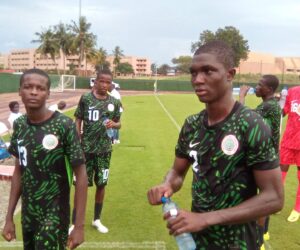Menstrual health remains one of Nigeria’s most pressing yet under-discussed public health challenges, with millions of women and girls struggling to access safe products, accurate information, and supportive environments.
In this exclusive interview with PREMIUM TIMES, Abdulhameed Adediran, Team Lead for Menstrual Health Initiatives at Population Services International (PSI) Nigeria, shares insights into the current state of menstrual health, the barriers caused by stigma and cultural taboos, and the role of policy in shaping a more inclusive future for women and girls.
PT: How would you describe the current state of menstrual health in Nigeria?
Adediran: I’d describe the current state of menstrual health in Nigeria as burdened. This is because in the past, there have been concerted efforts amongst stakeholders to improve on what used to be a more deplorable situation. I will look at this through three lenses of demand, supply and enabling environment.
In terms of demand, I will look at the comprehensive education. Until recently, Nigeria did not have a structured document that clearly outlined messaging, communication, education, and behavioural change strategies around menstrual health and hygiene.
This meant that for years, women and girls relied on fragmented information and rumours about how to manage their menstrual period. This includes how to dispose of the products, appropriately use their sanitary products and what to do when they encounter certain challenges during their menstrual period. So, this information was not available until recently.
In terms of access, we know that almost 100 per cent of disposable pads, which are commonly available in Nigeria, are imported. What this means is that, the price of the monthly commodity is left at the mercy of foreign exchange. As we know, foreign exchange is unfavourable and it directly impacts what is meant to be a basic need of every woman.
Even in terms of access, the distribution channel is restricted because not everyone feels comfortable stocking or distributing menstrual products, especially in rural areas. When that happens, women and girls opt for different options, usually unsanitary products that are used for sanitary services during their menstrual periods.
This is quite deplorable, and the experience we found in the field is worse than we thought. We’ve had reports of girls who use dry leaves, cow dung and their socks in place of pads.
That said, I like to describe the situation as both half-full and half-empty. With the concerted efforts of PSI, the Federal Ministry of Women Affairs and Social Development, and other partners, progress is being made. If we sustain these strategies, we believe improvements will come faster than expected.
PT: What are the most common challenges women and girls face in accessing menstrual products and information?
Adediran: The challenges cut across sections of social, cultural and economic lines. We observed that there is an economic stratification in access to products and services, including information. An instance of this is a girl in an urban area who has access to sophisticated, latest smartphones and can download different apps to monitor her flow, and if she is in pain, she can ask questions online amongst others.
Direct health services are more accessible to those of the high economic stratum than those of low socioeconomic status. What this means is that those in the rural areas have fewer opportunities for services and information.
As mentioned earlier, the common forms of menstrual products are disposable products which are not manufactured in Nigeria. This means that the rich have access to the high-end products by travelling abroad to get the best quality product to use for the whole year, until the next time they get to travel. While the poor do not even get the available basic option mainly because they either cannot afford it or it’s a luxury to them. Distribution is also limited, especially in rural communities where local vendors may not prioritise stocking these products.
For social reasons, we noticed that knowledge about menstrual health is just passed on from generation to generation. This means that the myths go along with whatever the right information is, as there is no way to verify what is right or wrong.
For the cultural aspect, we are in a very deep cultural country, so a lot of the cultures are passed from generation to generation and just end up being adopted and then passed on again. For instance, we had a social experiment where we asked a group of experts, doctors, and educationists how to dispose of menstrual products and the house was divided.
Some said you have to burn it, some said you have to wash it thoroughly, while others said you have to flush it. All these are going on because there is practically no structured way to dispose of these products, so it just becomes a culture of people going with trends.
PT: How do myths, stigma, and cultural taboos influence menstrual health practices and attitudes in Nigeria?
Adediran: During our trainings, we try to ask “What do you call menstruation in your culture”, and you could see the diversity in what menstruation is called, because nobody wants to come out straight and say, it is menstruation. That is the fundamental basis for the various stigmas that are associated with it.
Our culture gives the impression that it’s okay to say you have a headache or malaria, but it’s almost a taboo to say I’m on my period. If this is being passed from one generation to another, it becomes a norm and everybody thinks it’s okay not to disclose any information about one’s period. This means one thing; that girl will not be able to access the right services and products.
For instance, a girl goes to the supermarket but feels uncomfortable buying pads because she doesn’t want people to know she is menstruating, despite being a woman. Also, a girl doesn’t want to hold an extra pad when going out just to make sure nobody knows she is on her period and so on.
All of these put together affect the quality of life Nigerian women live during their menstrual period and the quality of the menstrual products and services they can access.
PT: What role can schools, workplaces, and community leaders play in improving menstrual health access and awareness?
Adediran: To be honest, since we got ourselves to where we are it is our responsibility to also take us out of where we are. We have spoken extensively about how our socio-cultural environment has impacted menstrual health. So, it means that for us to work it back, we also need to adopt the same strategy.
How can we do this? By getting each one to tell the other. It’s easier for people in the community to influence other people and say, We have agreed as a community that this is no longer the norm. And before you know it, it starts spreading out.
And when we talk about community, it varies. For instance, for us at PSI, we are building a group of people that we call the Menstrual Health Champions, and they cut across the different strata and layers of our society.
We also have them in the community, those we call the Community Menstrual Health Champions. These are influential within the community, like opinion, religious and cultural leaders within the community. We count on them to gradually, through various dialogue sessions, begin to change the narrative.
At the schools, because we know that teachers have a huge influence on what the girls become or believe in, we are also empowering them to pass down this knowledge.
ALSO READ: Nigerian govt validates policy on menstrual health, targets stigma-free society by 2030
We also have the Media Champions because a lot of people consume so much information from the media. Hence, we decided to infuse menstrual health into it and get them to pass this information so that, gradually we might begin to change the narrative and trend of menstrual health. We believe there is a tremendous role that individuals and communities can play when it comes to reversing the trend in the menstrual health challenges we face in Nigeria.
PT: Can you tell us about the menstrual health initiative by PSI?
Adediran: In PSI Nigeria, we have several projects cutting across reproductive health and other non-communicable diseases. Menstrual Health-No Wahala (MH-NoW) is a project that aims to improve the menstrual health of adolescent girls and young women between the ages of 10-24 in Nigeria, specifically in the six states of; Akwa-Ibom, Bauchi, Kano, Lagos, Nasarawa and Sokoto.
Most recently, further to this project we received a grant to provide menstrual and economic empowerment to women in Plateau state. What we do is intersect between improving access to menstrual health services and products and improving access to comprehensive information and education to address stigmas and taboos associated with menstrual health.
PT: Are there any successful menstrual health initiatives in Nigeria that could serve as models for wider adoption?
Adediran: If the monthly report received from the field is anything to go by, then I’d say the PSI menstrual health initiative is already a success. So far, we have a set of over 300 menstrual health champions and in three months, we have been able to reach over 200,000 people with menstrual health information and education.
We have also identified producers of reusable products within each state, and still using our network of champions, we have been able to identify a chain of distribution of these products. So far, we are still counting the number of pads being sold daily to adolescent girls and young women.
Again, if we can do this successfully in three LGAs each in six states, then we believe that this can always be replicated. Most importantly, there are cross-cutting efforts around creating an enabling environment for menstrual health.
We have been able to support the Federal Ministry of Women Affairs and Social Development to develop the very first National Policy on Menstrual Health and Hygiene Management in Nigeria, and we believe that, if this can be adopted in all states, it can help improve menstrual health.
We have also carried out smart advocacy training in PSI implementing states, and we are happy to scale it down to other states and provide resource materials. The training materials and behavioural change communication materials that we have developed are also available and have been adopted at the National level.
What this means is that anybody from Nigeria can pick these materials and use them to provide structured information, education and communication on menstrual health. So yes, these are models that have been tried and can be replicated in otherer states across the country.
PT: What are the biggest gaps in government or policy efforts to address menstrual health, and how can they be filled?
Adediran: I’d say generally, it is prioritisation. You’d observe that a lot of times, government priorities differ. Among government priorities, there is women health which mostly doesn’t rank very high even when discussing women matters. A lot of times when you talk about the needs of women, everybody talks about empowerment, distributing wrappers, grinding machines, bag of rice and others.
But beyond that, there are certain things that are fundamental to the livelihood of these women like the reproductive health. Even in discussing other issues of women’s health, the place of menstrual health so far has been found to be quite low which is not helpful.
I feel that a milestone in the recent validation of the policy on Menstrual Health and Hygiene Management is the big statement that the government is beginning to look in the direction of menstrual health.
Yes, the gaps are there. We have a particular state where there is even a budget line on menstrual health and for some reasons, the funds will not just be released because the person responsible doesn’t consider menstrual health a priority.
So, if we are able to put this policy into action, the budget is created, the funds are allocated and judiciously used, then the story of menstrual health in Nigeria will change for the better.
PT: What future steps or innovations would you recommend to improve menstrual health and reduce period poverty across the country?
Adediran: First, is that everyone should know that menstrual health is everybody’s business. Knowing this will make everyone identify their role and once this is known, they take up the responsibility and discharge. The impressive discovery I also have about menstrual health is the multi sectoral nature of it. That is why the concept of Technical Working Group has worked effectively at the national level, and we are promoting it at the sub-national level as well in our implementing states.
For instance, we have different roles for the Federal Ministry of Women Affairs, Federal Ministry of Health and Social Welfare, Ministry of Education, Standard Organisation of Nigeria (SON), National Agency for Food and Drug Administration and Control (NAFDAC) etc. Even at the sub-national level, this is how it is.
So, if we all can see that menstrual health first is human right, and secondly its everybody’s business then we’d have gone a long way to improve the health and wellbeing of our girls and women.










